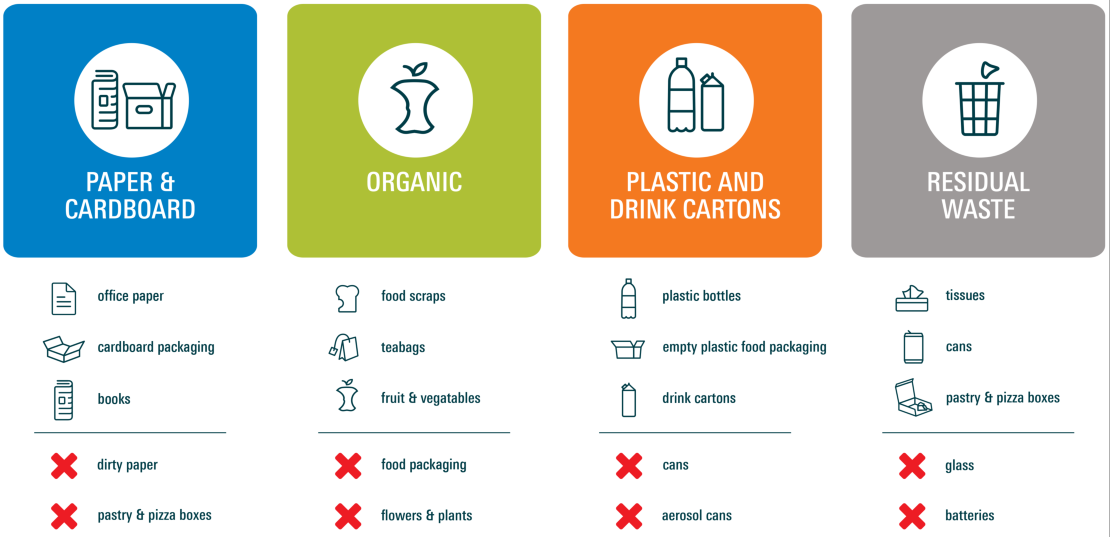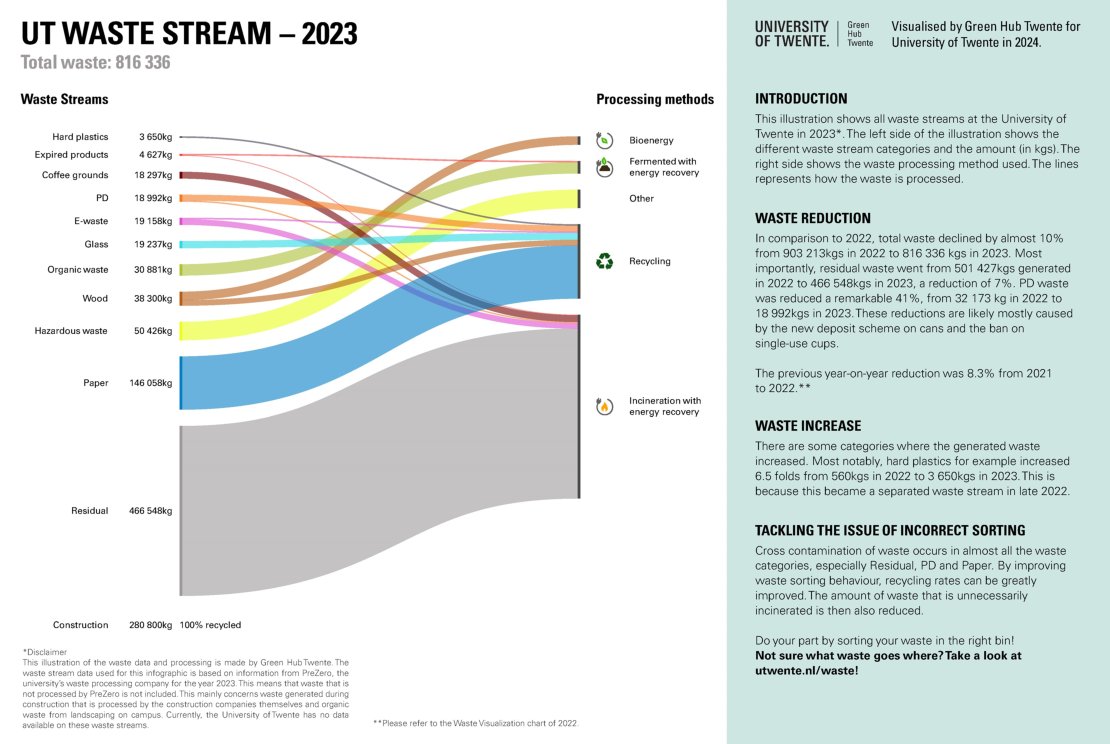Note: change in the separation of waste at UT
Starting 1 April 2023
The PMD waste stream (plastics, metal, and drinks cartons) has changed into PD waste (plastics and drinks cartons). As of this date the metal cans do not belong in this section of waste but should be returned to a collection point for a deposit. If you still want to throw them away, please do so in the residual waste. They will then be separated in the processing of the residual waste.
Waste on campus
At the University of Twente, we try to separate it as much as possible to facilitate recycling and what cannot be recycled we dispose of properly, safely and responsibly. On this page, you can find information about what waste goes where.
In all buildings on campus, you will find waste isles where you can seperate the four main waste streams. Places to dispose of less common waste, such as styrofoam or printer toners, can also be found.
What goes where
The four main waste streams are paper, organic, PD and residual waste. Here, you can find what waste goes where.
Still not sure?
Below you can find a more extensive list of permitted and not-permitted waste for each waste stream.
Permitted waste | Not permitted waste |
- Paper
- Cardboard
- Printing paper
- Paper with staple or paper clip
| - Used tissues
- Laminated paper
- Magazines
- Paper cups
- Contaminated paper
- Pizza boxes
- Foil and plastics
- Receipts
- Food residues
- Carbon paper
- Paper packaging with PE coating
- Drink cartons
- Binders
|
Permitted waste | Not permitted waste |
- Coffee grounds
- Coffee pads
- Tea bags
- Food waste
- Fruit and vegetable waste
- Bread
- Soup
- Fish and meat waste
- Dairy products
| - Packaging
- Paper and cardboard
- Flowers
- Oil
- Biobased plastic
- Aluminum coffee pods
- Cheese rind
- Shells (oysters etc.)
- Compostable bags
- Garden waste
- Spoiled animal by-products
- Paper towel with food residue
- Wooden cutlery
|
Plastic and drink cartons Permitted waste | Not permitted waste |
- Plastic bottles
- Drink cartons
- Plastic food packaging
- Plastic cosmetics packaging
- Paper coffee cups
- Candy wrappers
- Biobased plastics
- Plastic film (for wrapping food)
| - Cans
- Food waste
- Paper and cardboard
- Residual waste
- Styrofoam
- Aluminum packaging (crisps bags)
- Aluminum foil
- Hard plastics
- Not empty packaging
- Packaging > 5 liters
- Aerosols
- Packaging into which other material has been put
- Packaging > A4 size
- Packaging with hazard symbol
- Medication/chewing gum strips
|
Permitted waste | Not permitted waste |
- Face masks
- Aluminum packaging (crisps bags)
- Cans
- Pen
- Used tissues
- Plastic carrier bags
- Pringles cans
- Receipts
- Flowers
- Aluminum foil
- Packaging with multiple materials (e.g. plastic and paper)
- Wooden cutlery
| - Glass
- Batteries
- Electronics
- Chemical waste
- Toners and cartridges
- Electronics
- PVC
- Aerosols
- Cleaning cloths
- Smoke detectors
- Bulky waste
- Oils and liquids
|
Other waste streams
Here, you can find information about where you can dispose of less-common waste that does not fit the four main waste streams..
Collection takes place via Internal Service. For questions contact the Servicedesk of your building.
Permitted waste | Not permitted waste |
- Files
- Invoices
- Address databases
- Other confidential paper
| - Binders
- Laminated paper
- Cardboard
- Carbon paper
|
Collection takes place via Internal Service. For questions contact the Servicedesk of your building.
Permitted waste | Not permitted waste |
- Glass bottles
- Glass jars
- (Beer)glasses
| - Flat glass
- Test tubes
- Measuring cups
- Heat resistant glass
- Contaminated glass
|
Collection takes place via Internal Service. For questions contact the Servicedesk of your building.
Permitted waste | Not permitted waste |
- Wood
- Pallets
- Painted wood
- Fiberboard
- Plywood
- Concrete plywood
- Chipboard
- Hardboard
- Softboard
- OSB board
| - Painted wood
- Impregnated wood (Railway sleepers, fences)
- Trees and shrubs
- Burned wood
- Moldy or rotten wood
- Would mixed with glass, textile, plastic etc.
- Wooden cutlery
|
E-waste can be handed in at the LISA Service Desk ICT.
Permitted waste | Not permitted waste |
- Phones
- Computers
- Tablets
- Chargers
- Keyboard
- Camera’s
- Light bulbs
- Calculators
- Cables
| - Batteries
- E-waste with chemicals
- White goods
- Gas-discharge lamps
|
Collection takes place via Internal Service. For questions contact the Servicedesk of your building.
Permitted waste | Not permitted waste |
- Clean steel scrap
- Metals <20% contamination (bikes, washing machines etc.)
| - Metals> 20% contamination
- e-waste
- Radioactive metals
- Hazardous waste
|
Collection takes place via Internal Service. For questions contact the Servicedesk of your building.
Permitted waste | Not permitted waste |
| - Batteries
- Hazardous waste
- Explosives
- Carcasses
- Matrasses
- Electronics
- Medical waste
- Asbestos
|
Toners & cartridges, small chemical waste, batteries These can be handed in at service desks or dropped off at the central deposit boxes found in various places.
Toners & cartridges | Small chemical waste | Batteries |
| - Light bulbs
- Fluorescent tubes
- Aerosols
- Paint
- Mercury Thermometers
- Petrol
- Oil
|
|
Labs waste
Permitted waste | Not permitted waste |
- Styrofoam packaging
- Styrofoam peanuts
- Styrofoam sheets
| - Plastic film
- Hard plastic
- Plastic foil
|
Permitted waste | Not permitted waste |
- Plastic film
- Plastic carrier bags
- Shrink wrap
- Tubular film
| - Styrofoam
- Hard plastics
- PMD
- Scotch tape
|
Permitted waste | Not permitted waste |
All hard plastics including: - Pipette trays
- Jerry cans
- PVC
- Plastic containers
- Pipette with plug
| - Plastic foil
- Styrofoam
- Combined plastics
- Contaminated hard plastics
- Polyester
- Hazardous waste
- Electronics
- Rubber
- PMD
|
Permitted waste | Not permitted waste |
- Plastic packaging
- Plastic foil
| - Hard plastics
- Styrofoam
- Packaging with multiple materials (e.g. plastic and paper)
|
The manual for the disposal of industrial waste and hazardous waste is available via your building's waste contacts/VGM contact person. This manual, among other things, describes what can and cannot be disposed of and how hazardous waste must be packaged and provided for collection.
What happens to my waste?
Waste that you throw away on campus is collected and sorted by an employee of Asito, our cleaning company, or by a colleague from facility services. Outside, grounds maintenance company Krinkels collects the waste. It is then taken and processed by PreZero. More information about the collection schedule can be found here.
Waste collected at the UT is processed in several ways, ranging from incineration with energy recovery to recycling. By correctly sorting waste, you can help to reduce the amount of waste that is unneccesarily incinerated.
Waste stream visualisation
Click for a larger version.
More information
Would you like to know more about how the UT works on reducing waste? Take a look at the page about waste on the Sustainability website.
Do you still have questions? Please contact Central Servicedesk.
Last edit: 24 February 2025

